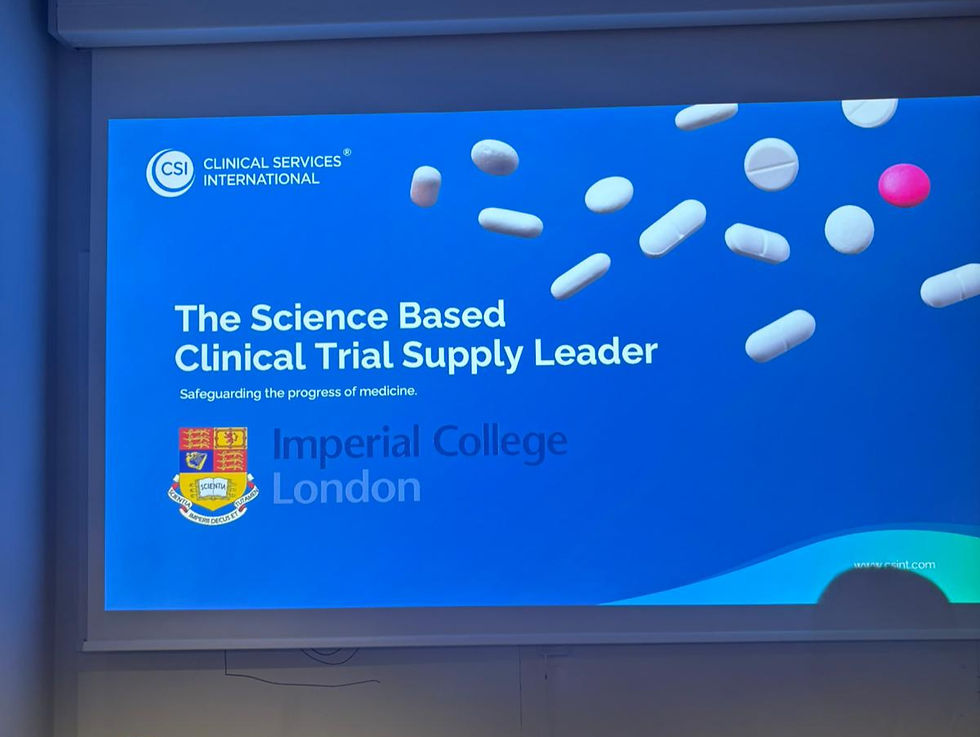Five types of clinical trial and best comparator sourcing strategies
- Clinical Services International (CSI)

- Dec 7, 2021
- 3 min read
Updated: Jan 26, 2024
Clinical trials are designed in different ways depending on primary and secondary endpoints and the product being investigated

Clinical trial designs determine the way the trial is structured and the impact it has on the participants.
The trial design significantly affects how the investigational products, comparators and concomitant medication must be sourced and supplied. This includes where the product is sourced from, how quickly it can be supplied, how it is packaged, stored and distributed.
Understanding the different types of clinical trials and designs is crucial to creating a sourcing strategy that effectively supplies the most suitable products for your study. There are 5 main types of clinical trial design: randomised trials, single-blind trials, add-on trials, open-label trials and double-blind trials.
Randomised clinical trials
A randomised clinical trial refers to randomly allocating trial participants to one or multiple treatments under the study. This is done to compare the outcomes of the different treatments or one treatment compared to a placebo. Randomised clinical trials are the most common trial design as they produce unbiased results.
When it comes to sourcing products for randomised trials, it is crucial for clinical trial suppliers to have all of the relevant information. This includes the number of participants in each arm of the study, the dosages required, the quantity of the medication, and the clinical distribution sites. This allows the supplier to locally or centrally source the products and supply them at the right time and place.
Single-blind clinical trials
Single blinding refers to the participants involved in the clinical trial being unaware of the medication they are taking. Only the investigator is aware of the product and cannot disclose any of the product information to the participants.
If a study is blinded, the clinical trial supplier must make a number of considerations. As well as blinding the active comparator drugs, the product documentation must be blinded, which can cause difficulties when it comes to importing and exporting products.
Double-blind clinical trials
In double-blinded clinical trials, neither the participants nor the investigators know which participants are receiving the treatment being investigated, and which are receiving the placebo or comparator. This is done to remove any bias and produce objective results.
Double-blinded studies can cause further challenges for suppliers because the study personnel must be unaware of the investigative product. This means the way products are shipped and stored must be considered. If the storage and shipping conditions are different for each product, blinding must be maintained to ensure the study staff cannot identify the products used.
Open-label clinical trials
In open-label clinical trials, both the participants and the investigators know the medication that is being studied. For this type of study, clinical trial suppliers do not have to take blinding requirements into consideration. Suppliers can locally source products without the need to repackage them as they are already in the local language.
There is also less regulatory pressure surrounding import and export, as the product is commercially available in the country of the trial and documentation can be obtained. Local wholesalers can often supply the comparator at a lower cost with shorter lead times than the manufacturer.
Add-on clinical trials
In add-on clinical studies, all of the participants receive the commercially available treatment, but some also receive an additional experimental product. The rest of the participants either do not receive the additional treatment or are given a placebo. The purpose of add-on trials is to test a mechanism in the additional treatment that has a different action from that of the established treatment.
When supplying products to add-on trials, great consideration must be applied at the protocol design level to ensure that the right products reach the right participants at the correct stage of the trial. Especially if the products are blinded, it is crucial to review the treatments to ensure they do not have adverse effects on the patients when combined.
Partnering with CSI, a world-leading comparator sourcing partner and clinical trial supplier, at the protocol design stage ensures that your trial runs efficiently and successfully. There is no one size fits all approach to comparator sourcing. We devise a bespoke sourcing strategy that caters to the type of trial and its design to find the most effective solution.
Contact us to discuss how we source comparators globally to ensure the successful supply of your clinical trials.




.png)
Comments